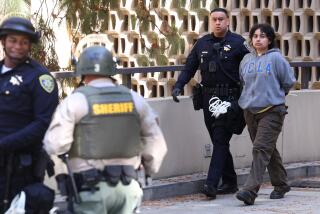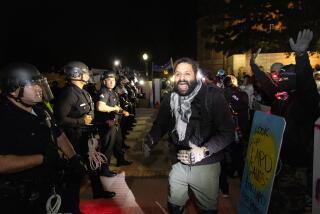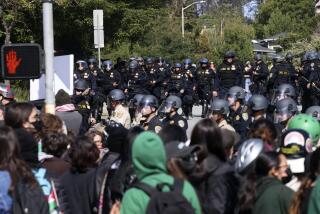From the Archives: Protest Crisis Splits China’s Leaders
BEIJING -- Crisis engulfed China on Thursday as the nation’s leaders appeared split over whether to use the army to put down massive demonstrations demanding that senior leader Deng Xiaoping step down.
Reports circulated among some Chinese officials and Communist Party members that commanders of the elite 38th Army have refused orders to move into Beijing and that other generals also refused to move troops. Some army units, however, were said to have begun heading toward the capital from outlying regions.
The 38th Army, stationed about 100 miles southwest of Beijing, is reputed to be one of China’s best-trained and most reliable units. Some soldiers from the 38th were moved to Beijing late last month when authorities were trying to control large-scale student marches.
Central Beijing was the scene of a second day of mass protest Thursday as hundreds of thousands of demonstrators--some estimates placed the total at 1 million--gathered in and near Tian An Men Square. Slogans were broadly aimed against the entire leadership but also focused with growing intensity on the 84-year-old Deng.
Before dawn this morning, Communist Party General Secretary Zhao Ziyang, looking somber and tired, appeared at the square to speak with pro-democracy students who have been on a hunger strike since Saturday, and he pleaded with them to end their protest.
“We were too late coming. I’m sorry,” Zhao said in a seven-minute speech later broadcast on state-run television. “Your criticism of us is justified. I’m not here to ask your forgiveness. I’m just saying that your bodies have become very weak. Your hunger strike is already in its seventh day. Things can’t go on like this.”
Pleads With Students
Zhao, who was accompanied by Premier Li Peng, said that “the situation in Beijing can’t go on like this” and pleaded with the students to “understand what a serious point you’ve brought things to.” He promised that government and party leaders would continue to listen to the students’ views even after they end their protest.
Zhao’s comments were made in the security of one of about 150 buses parked in the square to provide demonstrators with shelter from thunderstorms. Students on the bus appeared to react favorably to Zhao’s speech and seemed happy to get his autograph. But students in the square later said that a large majority of the protesters were not satisfied and would continue their demonstration.
“This talk by Zhao Ziyang is the same as the three recent discussions they’ve had with students,” said one protester. “They’re cheating us all the time. They’re not sincere, and they’re doing as little as they can. They have to come see us--that’s the least they can do. They’re not doing any more than they have to. These little talks do not solve problems, and they are not a real dialogue.”
In one of these earlier talks, Premier Li, who has been one of the key targets of criticism, spoke Thursday with 12 protest leaders, telling them that “disorder has now occurred in Beijing and spread to the whole country.” He also appealed unsuccessfully to the students to end their protest.
Throughout most of the day Thursday, open-backed trucks raced through Beijing, horns blaring, carrying workers with banners that criticized Deng and proclaimed support for the 2,000 or so hunger-striking students still in Tian An Men Square. More than 1,000 hunger strikers have been taken away for treatment, medical workers say, but some have returned to the square after partially recovering.
“Victory Is Within Sight,” declared one banner on a truck.
Zhao, widely viewed as the most enthusiastic advocate of rapid reform among China’s top leaders, continued to be spared specific criticism.
Many protesters said Thursday that their actions might help Zhao consolidate power as Deng’s successor, but these same people denied having any enthusiasm for him. A group of half a dozen students interviewed in Tian An Men Square said the key goal of the demonstrations is to force elderly and hard-line orthodox leaders from power and place the government in the hands of “the reform faction” headed by Zhao.
“This is just choosing the lesser of two evils,” one of the students said. “We aren’t supporting or opposing Zhao Ziyang. We still haven’t expressed an opinion about him.”
In his 50-minute meeting with student leaders, held in the Great Hall of the People and broadcast later over government television, Li appeared to hint at a possible crackdown.
“The government of the People’s Republic of China is responsible for the whole nation,” Li said. “We have the duty to safeguard the students’ lives, factories, the fruits of socialism and our capital.”
Li suggested to the student leaders that “all hunger strikers be hospitalized right now, without waiting until they are critically ill,” according to the New China News Agency.
“The students should leave the square without preconditions,” Li continued. “Tell them to leave the square.”
Apparently angered, one of the student leaders, 21-year-old Wuer Kaixi, retorted: “Whether we leave the square or not is not ours to decide. The responsibility is on the government side.”
The meeting then collapsed when one student leader told Li, “This is not a dialogue.”
Party leader Zhao, since first making a conciliatory statement toward the students on May 4, has taken the lead in promoting a soft approach toward the pro-democracy demonstrations, which began in mid-April. He has repeatedly stated that the students are patriotic and that many of their goals, such as political reform, more funding of education and an end to official corruption, conform with what the Communist Party itself wants to accomplish.
The Thursday evening national television news program showed pre-dawn visits to hospitalized hunger strikers by Zhao, Li and two other members of the Politburo’s Standing Committee, Hu Qili and Qiao Shi.
“Zhao Ziyang, Li Peng and the other leaders affirmed the enthusiastic patriotism of the students,” the television news reported. “They said that the zeal of the students to demand democracy and the rule of law, oppose corruption and push forward reform is very commendable.”
The newscast quoted Zhao as stating that “the goals of the Communist Party and the government are the same as those of the students--there is no basic conflict.”
“There are various methods we can use to share our thoughts and solve problems,” Zhao said. “There’s no need to use the method of a hunger strike. You’re still very young, you still have a lot of time to make contributions to the nation. You should take care of your health.”
Li, in his later talk with students, declared: “The situation will not develop as you wish and expect, even though you have patriotic zeal. . . . I do not intend to blame the students for all the turmoil. But I hope you will think over what the final consequences might be should the situation worsen.”
Support for the student demonstrators, who remain at the core of the protest, has come from broad sectors of society in the last few days, including employees of many mainstream organizations controlled by the Communist Party.
The People’s Daily, official newspaper of the Communist Party, reported that more than 1,000 of its own employees had marched in Wednesday’s demonstrations, with some high-ranking editors and reporters marching in front.
More to Read
Sign up for Essential California
The most important California stories and recommendations in your inbox every morning.
You may occasionally receive promotional content from the Los Angeles Times.










